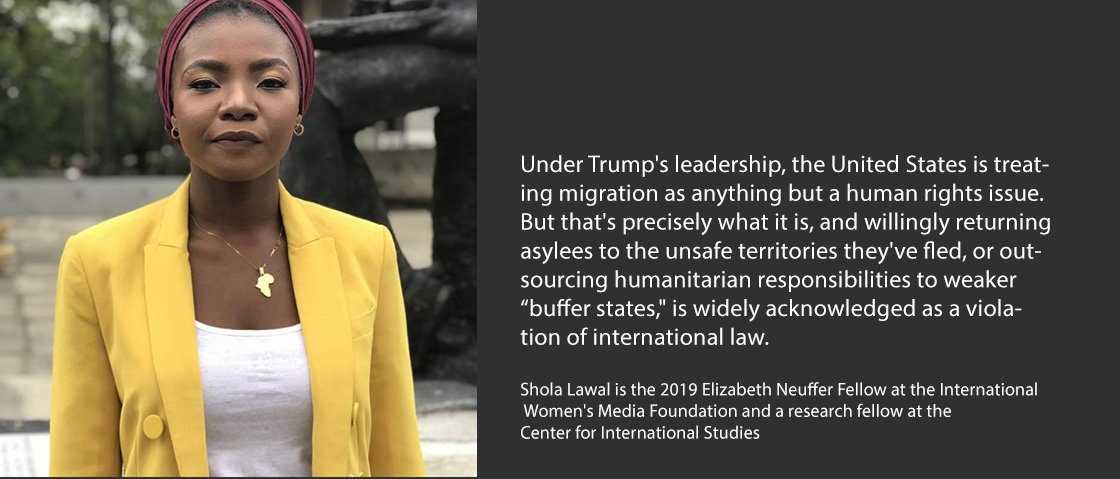This Boston Globe opinion piece was written by Nigerian journalist Shola Lawal. Lawal is the 2019 Elizabeth Neuffer Fellow at the International Women's Media Foundation and a research fellow at MIT's Center for International Studies.
Men, women, and children—mainly from the Democratic Republic of Congo and Cameroon—chanted and sang for their freedom. Troops from Mexico's National Guard stationed in the border town of Tapachula watched the demonstrations warily at first, and then they pounced. Some of the protestors say they were beaten and that women, some pregnant, were kicked. That was the scene at the Mexican border with Guatemala last month.
While media coverage of the migrant crisis at the border has focused on the thousands of asylum seekers from Central America, little has been reported about the waves of migrants from African countries attempting to cross.
Hundreds of Africans have been held in Mexico for months, blocked from entering the country and heading north to their intended destination: the United States or Canada. Some are fleeing political repression in countries like Eritrea. Others are fleeing from violent conflicts in central African countries like the DRC and Cameroon.
Some of the world's most neglected humanitarian crises are on the African continent, and the lives of millions are at risk. Ongoing conflict in the resource-rich DRC has displaced 4.5 million people since 2016. (The DRC has known little peace since the assassination, in 1961, of Patrice Lumumba, the country's first prime minister—an act in which the US government was implicated.) Many have fled to neighboring African countries. In Cameroon, separatist conflict in anglophone regions has left hundreds dead and is getting bloodier by the day.
President Trump's vicious asylum ban, primarily targeting Central American migration, will also have a devastating impact on these people who are fleeing conflict in African countries.
The number of Africans crossing into Mexico has risen drastically—Mexican officials recorded almost 3,000 last year, four times the numbers since 2014. That increase may be attributed to increased fighting in the region and to the European Union-backed blockade of Libya, a gateway for many Africans to Italy, Spain, and Greece. The numbers in Mexico correspond to a significant drop in the number of asylum seekers hoping to reach Europe via the Mediterranean, a deadly venture. And just as the European Union turns its back on those seeking shelter by employing vicious policies—forcing thousands back to unsafe zones in war-torn Libya, or avoiding migrants on precarious unseaworthy boats in the Mediterranean— the United States is doing the same.
Mexico, a key part of Trump's anti-immigrant strategy, unfortunately bowed to pressure from Trump in May. Mexican customs officials stopped issuing documents allowing migrants to move through the country and up to the United States. That move sparked the demonstrations and clashes at the border.
Migrants from Africa take extremely dangerous measures to reach Mexico. The journey covers thousands of miles and takes them through deadly terrain. First they fly to Brazil or Ecuador, then take a perilous trek through the jungle of the Darien Gap connecting Colombia and Panama, that lasts days. Some don't survive. Migrants describe stepping over dead bodies and leaving wounded comrades behind.
But now, with the Supreme Court's ruling on Trump's asylum ban, the wait will get harder for those who managed to survive that journey. The rule bans them—along with Central American refugees—from seeking asylum in the United States unless they have first sought refuge from and been rejected by one of the countries they passed through.
The US has bullied Guatemala into declaring as a “safe third country," meaning African migrants can seek refuge there. Honduras and El Salvador have also agreed to cooperative asylum deals that closely resemble safe third country.
The problem with the third safe country designation is that the Northern Triangle (Guatemala, Honduras, and El Salvador) is anything but safe, not even for natives. El Salvador has one of the highest homicide rates in the world and the others are not much better. They don't have the processing power either—El Salvador has one asylum officer. “They are definitely not ready nor capable of responding," Mexican journalist Mariana Limon told me. Vulnerable African migrants, who may already have been traumatized, may be exposed to gang violence from groups like the Mara Salvatrucha in El Salvador. They will face intense racial discrimination, unemployment, and poverty in Central America. “For women, it might be worse," Limon says, because “sexual violence is common. Aggressors could be coyotes [people smugglers], local criminals, or even policemen. To obtain money or food, women might turn to prostitution because they have no other option."
Mexico has not been declared a safe third country yet, and many Africans there now wait in limbo. There is some hope that legal challenges against Trump's ban in lower courts will ease their passage. If that doesn't happen, the future is bleak—scores will probably be deported, others will be forced to seek asylum in the country.
Under Trump's leadership, the United States is treating migration as anything but a human rights issue. But that's precisely what it is, and willingly returning asylees to the unsafe territories they've fled, or outsourcing humanitarian responsibilities to weaker “buffer states," is widely acknowledged as a violation of international law.
It is also tantamount to sending many people to their graves. This is the time to help distressed migrants with nowhere to go and no home to return to—not the time to increase their suffering. As the Kenyan-born Somali poet Warsan Shire wrote in “Home," “No one leaves home unless home is the mouth of a shark."
Nigerian journalist Shola Lawal is the 2019 Elizabeth Neuffer Fellow at the International Women's Media Foundation and a research fellow at MIT's Center for International Studies.




